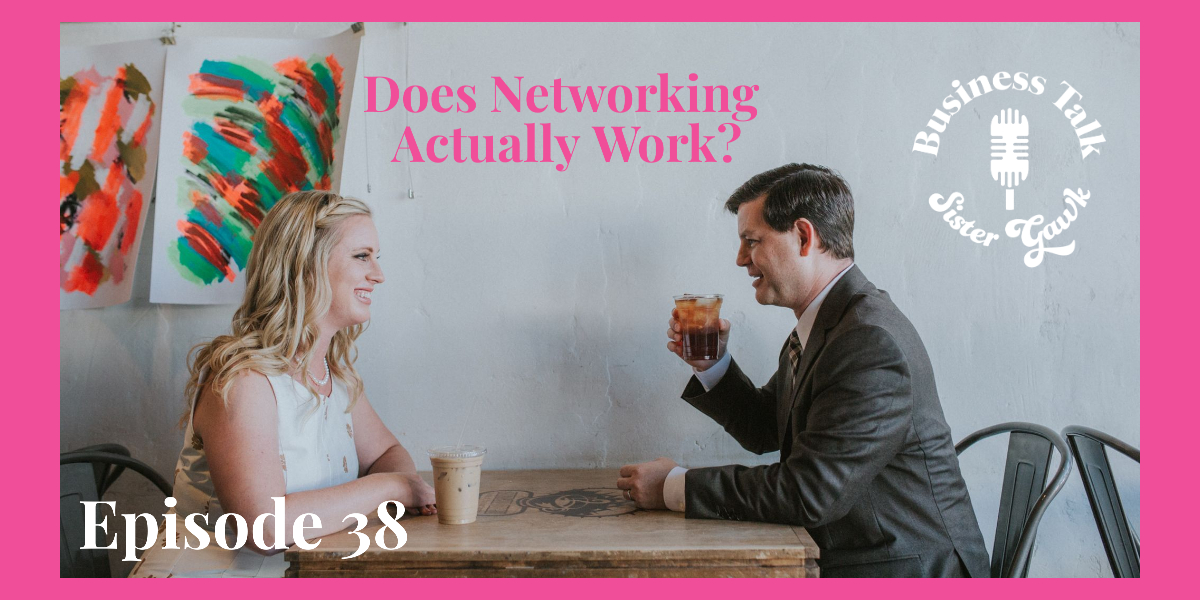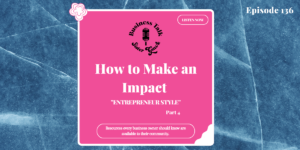Welcome to Business Talk Sister Gawk. I’m Bekkah! And I’m Ruthie! And today we are going to be talking about “Does Networking Actually Work?” *Ruthie laughs*
Ruthie: I always feel the need to make like some “Dun duh!” or some kind of sound, so I was refraining from that.
Bekkah: And then you just started laughing.
Ruthie: And then I laughed.
Networking for Your Business Works, But Not Usually Right Away
Bekkah: Okay so the question is, Does networking actually work?” and we’re going to talk about that a little bit in detail. To answer that off the bat, the first year of networking is not fruitful in some ways. Because you’re learning about people, business, and problems all that kind of stuff. Now when I say “fruitful” what I mean by that is, it’s not financially fruitful.
Ruthie: It’s not going to generate a lot of income for you right off the bat.
Bekkah: It is fruitful in terms of relationship building.
Ruthie: Tell us more about that.
Bekkah: Okay. When you network with people and, I’m just gonna clarify, when we’re talking about “networking” we’re talking about the traditional sense of creating relationships with people, getting to know them, and what they do. Now there’s a lot of these new programs out there that people will talk to you about, about networking schemes and all of this stuff and some of them are really focused on pyramid schemes. That is not what we are talking about. We are talking about developing quality relationships with other people. Now that we’ve clarified that, when you’re talking to people where do you find these people or how do you grow your network of people?
Where Do You Find People to Grow Your Business Network?
Ruthie: In a digital sense, I’ll touch on that and then Bekkah can talk about a couple other avenues, but in the digital world, LinkedIn is amazing for this. I know Bekkah has talked about on other episodes where you can they have a whole networking program that you can sign up to basically have a business mentor and then you get put into this pool and then basically their algorithm tries to match you with people that they think you would be a good fit with. Then it’s your responsibility to reach out to them and whatnot but LinkedIn is a really good place to make connections. Right now, I take a whole bunch of LinkedIn courses on LinkedIn Learning, and if I have a teacher that I think is really good I go and add them on LinkedIn. And just the other day – it was the coolest thing ever!
I’ve never had this happen before! I connected with this one guy and then his assistant messaged me and was like, “Hey, he has like a certain amount of close connections or something that he can have.” I don’t remember what it was but he was like, “But thank you so much for reaching out. It really means a lot that you liked his material and everything! Let us know if there’s anything that you have questions about or whatever.” He’s this professor at a different – I don’t even remember what school it’s at but, anyway, I was like, “Wow! That is so cool that like this person that I really look up to I was able to connect with on LinkedIn. In a digital sense, LinkedIn is a really good way to build that networking and then be able to start the conversation, not necessarily maintain it, but it’s a good place to kind of get a good platform to begin the conversation. Bekkah, tell us a little bit more about the actual, tangible form of networking as opposed to the digital form.
Have a Plan To Just Get to Know People When You Network
Bekkah: Yeah and we can go back to the digital, too, because there’s a lot of different platforms you can do that on besides LinkedIn, but the actual in-person events, which is a little bit hard now with a lot of these like safety restrictions and stuff with COVID, but in the past and I’m assuming it’s gonna come back. We’re social beings. There’s no way we’re going to stop meeting in person, entirely. In the past, there are a lot of different events like Chamber of Commerce parties or all these different business entrepreneurship things. There are lots of opportunities to get to know people. It doesn’t always necessarily have to be an experience where your goal, like you’re going into it as “I am going to make three sales.”
When You Network Don’t Have Ulterior Motives or Expect That People Owe You Something
Ruthie: This is huge! I love that you just said that because I am a big fan of GaryVee. Bekkah’s also a big fan of GaryVee. If you ever want to check him out just know that he does swear, so if that’s something that is an issue with you, don’t look him up! Problem solved! He has so much good content like just really good stuff, but anyway like one thing that he talks about a lot is going into conversations with people having no expectation of them. Just no expectations, in general, he just talks about that a lot. Not necessarily not having goals but not going into it like “If I do this for you, you will then do this for me.”
He always talks about just giving and then leaving it, you know? He gave this example of how he helped this one guy get this multi-million dollar sale and then a few years later GaryVee wrote this book and went to him and said, “Hey, could you buy a couple copies? I’m just starting out.” And the guy was like, “Absolutely not. Why would you ask me?” And then he (GaryVee) was like, “I say that not so that it can be like, ‘Oh, woe is me! This guy totally jipped me or whatever. I did all this stuff for him!’ but to say that I was able to walk away from that situation knowing, ‘Yeah, that’s okay’ and it did not personally offend me because I knew I went and did that for him having no expectation of him ever returning the favor.” And that may be kind of is a cynical outlook, but honestly like it’s just like that sacrificial, “I’m doing this for you with no expectation of that return.”
Ruthie: When Bekkah’s talking about going to these networking events not going like, “I’m going to make this amount of money,” or, “I’m going to connect with these people and they better refer this amount of business to me,” or whatever but just going to just meet people and get to know them and get to know their stories! So tell us a little bit more about that, Bekkah.
Ask People Questions About Themselves While Networking
Bekkah: When you talk with people and a long time ago when I was first starting in sales I was really like, “Well, how do I do this better?” And they kind of talked about “Always be open to collaboration and always be just talking to people about what they do.” And actually, I really didn’t even truly learn the heart of that until a little bit later when I started realizing the genuineness. How to tell the difference between a genuine person and a non-genuine person in a relationship or conversation. Part of that is when you go to a networking event, say you’re gonna go to a party that’s for business people, understanding that you’re there to glean information to learn about what this person does, why they do it what their problems are, and hearing those things you’re going to start, especially, if you pick one industry, you’re going to start seeing –
Ruthie: What do you mean by “problems”? Are you talking like, “Tell me all about your childhood!”
Bekkah: No, no, no, no. Yeah, alright, that’s a great question. Okay. Let’s just pick an industry. I started in a couple different industries, but if you start seeing common themes that people are struggling with or whatever you’re like, “Tell me about your business?” And they start talking, “Well, this is what I do and these different things.” And you just ask more questions like, “Wow!” A common question right now is “How has COVID affected your business? Has it at all?” And then they start telling you, “Well, you know, we had to change all these things and this is really the hardest part for me.”
And you’re gonna find that the things that you thought were gonna be the hardest thing are never actually the truth of what they’re really struggling with. I mean just those kind of conversation starters and getting to know people and what’s going on in their business. Or even, “Wow! How’d you start out with this? That’s incredible! Have you ever considered doing this?” And a lot of times people, especially, when I see a diversification opportunity or whatever they’ll say, “Actually, yeah! We thought about that! We totally did but we just don’t have the time for that” Or “Actually, we did that but it was way too much paperwork and in the long run it wasn’t meeting our personal family goals.”
I just recently talked to somebody, just the cutest business owner! Oh, she’s wonderful! She’s getting ready to retire and she was just talking all about, “You know, I used to do a lot of this and it was very lucrative, but the reality is that I wanted to spend more time with my family. This was me working on the road all the time and we just decided that even though it’s a lucrative part of our business we don’t need it to have a quality life.”
As You Learn About Other Business Owners, You May Find Ways to Connect Them Other Great People
That, to me, was really interesting because you just learn so much about people and their value systems and what problems they have, and then as you network you’ll start realizing that other people are facing similar things or maybe have solved something that this person is struggling with. That’s where networking is beautiful, because when you find out like, “No way! You do this thing and you’re having this problem? You want to know something? I recently talked to somebody who’s also experiencing the same problem and they went through this process to solve that! Have you ever considered it?” Suddenly you have this “Aha!” moment for that person that you literally did nothing but learn from one person and share some knowledge with another person. Or even saying, “You know, you guys should really get together! I think that would be a great opportunity for you to learn from one another and create a good relationship!”
Business Networking Should be About Discovering How You Can Be a Resource to Others
Ruthie: With that, when you think about networking, a lot of people think of it as like, “What can I get out of that situation?” What you really have to think about with networking is “How can I add value to this person?” Like what Bekkah was saying, if you’re talking with someone who has an issue with their, I don’t know, like their SEO or something like that and you just had a conversation with someone whose main specialty is SEO or whatever that is you’re like, “Oh! You should talk with so and so!” And it’s not always like, “Let me help you with that! Let me do that with you!” It’s like, “Let me get you to the person that will help!” One of my favorite things ever, I didn’t realize this until recently, is making connection calls.
Knowing my friends and knowing their skill set and knowing what their life trajectory is and then meeting someone and saying, “Oh my goodness! This is exactly what this person wants to do with their life!” And then I talk with that person and say, “Hey, would you want to connect with this person?” And then I call the person – okay so Person A is going to school for accounting, okay? Person B needs an accountant. Then talking with the Person A then going to Person B and saying, “Here’s this Person A! They’re so great! They have all these really cool things! They have a whole list of questions and they would love to talk with you about that! Could I give them your information?” Being that middle man is one of my favorite things ever because then I just get to hype other people up and I get to make fun connections. Ah! I just love that! Coming back to the heart of networking which is adding value to other people. Tell me about networking, Bekkah. Is it risky? What is the level of risk in networking versus reward?
Is Business Networking A Risky to Do?
Bekkah: I think that networking is one of the lowest risk things you can do to create –
Ruthie: Boom. *laughs at self*
Bekkah: – To create value in your business and get your name out there. I mean it’s one of the lowest marketing cost things you can possibly do in a lot of ways because you’re representing yourself. I will say, yes, it is risky! Especially if you have a volatile personality because then people really get to know who you really are, right? But at the same time, if you’re doing it right and you’re doing the self-reflection and saying, “How can I get better and why didn’t that go well?” There have been so many opportunities where I have had to go through, “Okay, why didn’t that end well?” When I start reflecting on the conversation I had with them maybe it’s because I had ulterior motives that I was trying to close a sale and that was not appropriate.
Or, I mean, it was because that was my job to do this and that was the expectation on me from a company but if you’re your own business you have the choice to create that time and value in the relationship that is not the pressure of being just solely a salesperson. When you develop those conversations people will test you. There are different ways that people are testing you. First of all, people are testing you to see if you’re a genuine person or if you’re just trying to sell them something, right? They want to know what your intentions are and at the same time, you should be testing other people to know what their intentions are.
Ruthie: How do you do that?
Bekkah: A lot of times, so the best way to start is first by asking questions of someone. When you meet them whatever you say, “Oh, what are you here for? What is your business?” Or asking about, “Wow that’s really interesting, so how do you do that?” Or like, “What got you involved in that, originally?” This is something that I learned from the History Chicks. Actually, it was Catherine the Great. The podcast, Ruthie was like, “You need to listen to this!”
Ruthie: The History Chicks! So good! I love their podcast!
Bekkah: Great podcast! Within the things that Catherine the Great did is that she was really good at the emotional intelligence of asking other people questions.
Ruthie: Even as a young girl! And that’s how she got so many people on her side when she became the queen!
Bekkah: BT-dubs! *Bekkah-Slang for “By The Way”* Did you know she overthrew the whole – Did a coup! Like wow! You really have to have good social skills to make a coup happen!
Ruthie: Because all of these major leaders loved her because they she would just sit and ask them question after question was genuinely interested in what they did and then they ended up helping her down the road. So maybe there was ulterior motives? But she was really good at that.
Bekkah: People love talking about themselves!
Ruthie: So true, yeah!
How to Evaluate Other People’s Intentions While Networking
Bekkah: Ask them questions! In terms of when we’re talking about the riskiness and people testing you, it’s really good to listen to the words that people are using because sometimes their intentions are not good and I would say this is not as common all the time but it depends on the industry that you’re in and what those people are thinking. But the things that I have heard come out of people’s mouths that I start realizing, okay, I need to be really good at safeguarding myself from risk are things like, “Oh, did you come here by yourself?” “Where are you staying?” Those kind of things for me, as a woman, a business owner going to a conference, those are questions that I start realizing, “You know, your intentions are not right and I am not going to be hanging out with you.” Those kinds of questions saying, “You’re literally here to waste my time in terms of being a genuine person of connection.”
It’s not necessarily like “waste my time” in terms of I’m not to make any money in a sale, no! It’s just you’re not a genuine person that’s truly interested in me. You’re interested in something else that nobody should be here for. That’s something that figuring out those kinds of questions is really good by digging a little further in those conversations you can end them pretty quickly by saying things like, “So tell me about your business.” and, “What is going on in that? How does that look for you?” Go ahead, Ruthie. She’s got something.
Ruthie: I raised my hand. On that note, Bekkah and I are gonna do another episode about boundaries in business and stuff but I know for me and for Bekkah, also, we are both women business owners and there is a difference in how women interact, I don’t know. Not necessarily “interact” but just – there are differences that maybe men don’t experience as much. I think just being able to recognize that verbiage is really important and being able to recognize like, “Hmm.” Maybe you’re not as emotionally astute or whatever but like being able to say, “Oh! Wait a second! They just said that. Hmm, how did that make me feel? What just happened there?” And just really being able to kind of set those things up for you so that you know, “I’m not in a safe situation right now.” And then going back to like setting up safety guidelines for yourself with networking. Pay attention to the verbiage that people are using but then also pay attention to where you’re trying to network. Don’t ever find yourself alone in a room with somebody else like that’s just I mean, yeah it sounds practical, but really being intentional about that. If you’re at a conference stay in a public place you know. If you’re going to meet with someone don’t try to be like, “Hey, come to my house!” You should draw the line there. Don’t do that.
Bekkah: And I will speak to that. There have been experiences where something like that has happened to me and then I’m like, Oh, I think that wasn’t a good idea. I should have had someone else with me when I did this.” Or whatever and it’s not necessarily that anything bad has happened but I’ve taken the time of self-reflection to be like, “In another situation, if I did not know this person very well this would have been a bad idea.” But the networking piece of it like we’re just gonna go back to that because we’re gonna talk about boundaries later. When you get to know someone people are gonna test you in terms of your trustworthiness. That starts if somebody gives you their business card and you say you’re going to follow up with them, you sure better do it. You better be sending that person an email and if you’re saying, “Yeah, I want to get to know you better. Let’s collaborate on something or whatever.”
Event Networking Can Allow You To Schedule a Future Connection
I had the opportunity to meet somebody one time at a Christmas party and we just kind of were there as mentors to other kids and stuff and I was like, “Tell me about your business.” And it was just so interesting to me I was like, “Hey, we should get together and talk about this on the phone sometime or whatever.” So I took the initiative to make sure that I did follow up with that person and if it’s not something that happens in the near future because they’re just a busy person you need to push it forward to a date that’s agreeable to everybody.
Respect The Fact That Some People Will Not Have the Time To Network With You
There are some business owners quite honestly that are just not going to have the time and that’s okay. For those people, that’s when you just send them a quick text or quick email saying, “You know what, I just really appreciated getting to know you. If ever you have the time and you want to schedule something I would totally be open to that in my schedule.” Making sure that they have the space to reach out to you is important in that. But people are testing you to see if you’re going to follow through. If you ever ask someone for advice on something or ask for a book recommendation you should not be going back to that person and talking to them unless you’ve done what they told you to do. I feel really strongly about that because it really proves that you’re a valuable person that you honor what you said you were going to commit to.
Ruthie: Not necessarily “valuable person”, but the relationship is going to prove valuable because you guys are both following up on what you said you were going to do.
Bekkah: We could talk about this all day.




